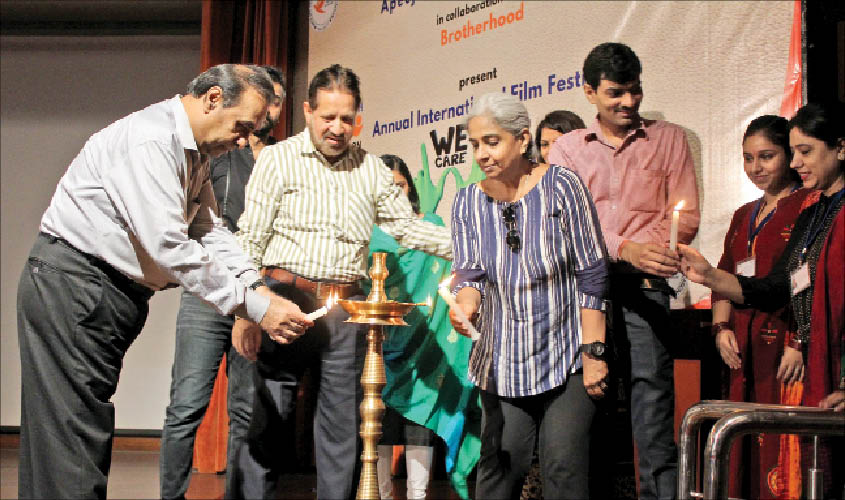Apeejay Institute of Mass Communication (AIMC) organised the 11th edition of its annual We Care International Film Festival from 6-8 November 2019. The festival endeavours to throw the spotlight on the heroism and struggle of millions of differently-abled people around the globe, and to acknowledge their special abilities. The three-day festival was organised in association with the internationally recognised NGO Brotherhood and with support of UNESCO and the UN Information Centre.
As part of the festival, a photography and painting exhibition was also hosted on the same theme. The Indian and foreign films that were screened here included the National Award-winning Goonga Pehelwan from India; the Iranian film Fish and I; the Russian film Blind Date; Basket Bronx from Spain; White Balance from Israel; the Chinese film Children of the Stars; More Than Walking from the USA; Beyond Borders from Belgium; and Departure Lounge from the United Kingdom, among others.
“We have been doing the We Care International Film Festival for the last decade with an NGO called Brotherhood, and this is our 11th year. The reason behind this is to make everyone realise that there is no such thing as a disability. Everyone is specially-abled. In society, we achieve success with our actions, willpower, passion, and enthusiasm. So there is no distinction between people,” asserts Prof. Sajal Mukherjee, director, Apeejay Institute of Mass Communication.
“I also chaired the ‘We Care’ jury a couple of years ago. I have been a part of so many festivals. One thing we felt is that the disability issue is something about which media students in particular should be sensitized, because they are the ones who disseminate information and create awareness in society. They are the future journalists and if we are able to sensitise them at a young age, then once they are in their professions they would be able to lead from the front in this regard. Through this festival we don’t want them to have sympathy; rather, we want them to have empathy towards the specially-abled, who deserve their place as equal citizens,” explains K.G. Suresh, Professor Emeritus, Apeejay Institute of Mass Communication, and former director general, Indian Institute of Mass Communication.

“The gold and other medals won by the Indian Paralympic team at Rio showcases the contributions of the specially-abled people. We Care Film Festival is our ongoing endeavour to address the wrong imagery surrounding them. They can learn to lead a normal life if they have an effective access to services like early identification, intervention, education, vocational training and employment opportunities,” says Satish Kapoor of the Brotherhood NGO.
Special guests who attended the event included Ira Singhal, IAS Officer, Deputy Commissioner, North Delhi Municipal Corporation, who is the first differently-abled woman to top the civil services in the general category; Navika Kumar, managing editor, Times Now; Rajiv Chandran, officer-in-charge, UN National Information Officer for India & Bhutan, United Nations Information Centre; and Eric Falt, director and UNESCO representative to Bhutan, India, Maldives and Sri Lanka.
“Our founder chairman, Dr. Satya Paul, was on the wheelchair, having suffered from polio in his childhood. Wherever he went for admission he had to face a lot of prejudice, and so he had to struggle a lot in order to get the opportunities he deserved. He was brilliant in academics, a gold medalist in mathematics, an eminent educationist, and a pioneering entrepreneur who provided the foundation and inspiration for the emergence of the Apeejay Stya Group and the Apeejay Education Society. Today we have 13 schools, 11 higher education institutions and one university and all of them are access- friendly, where everybody is given equal opportunity,” says Dr. Mukherjee.

